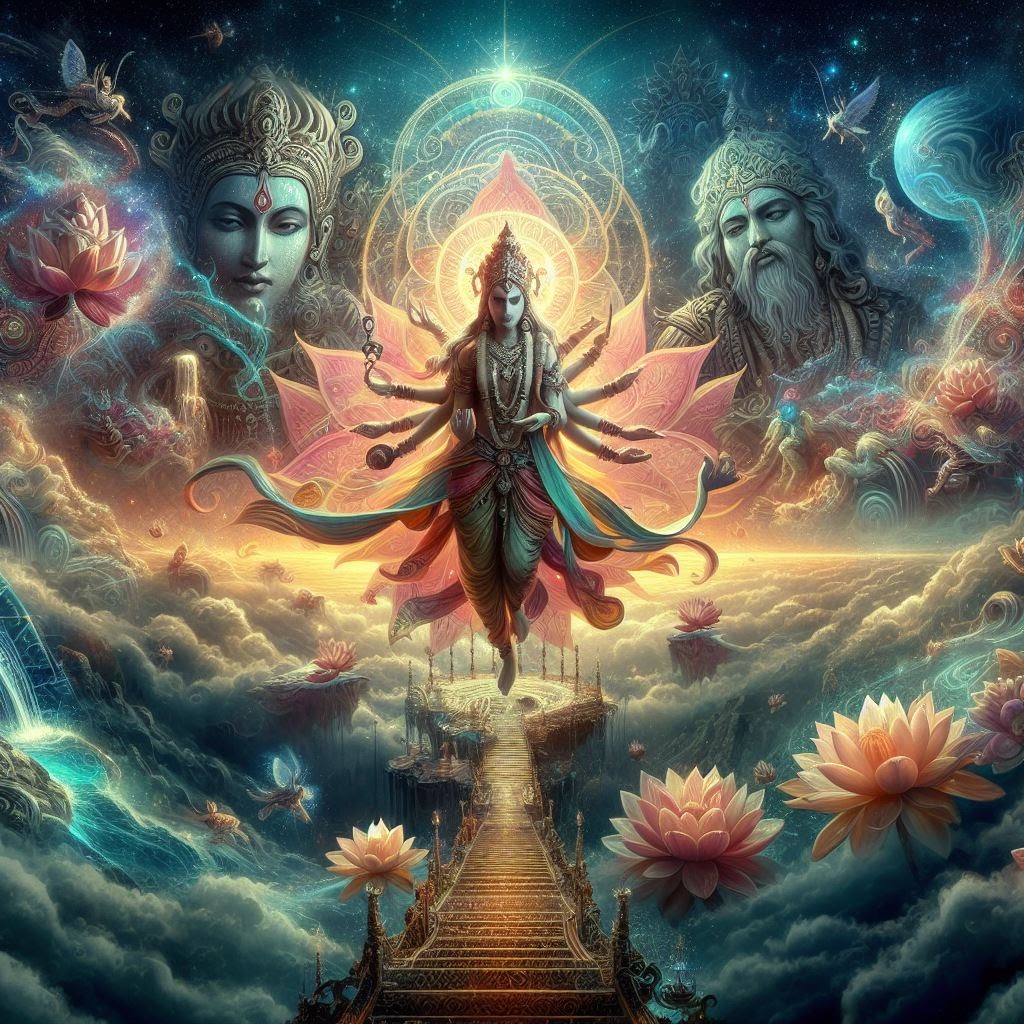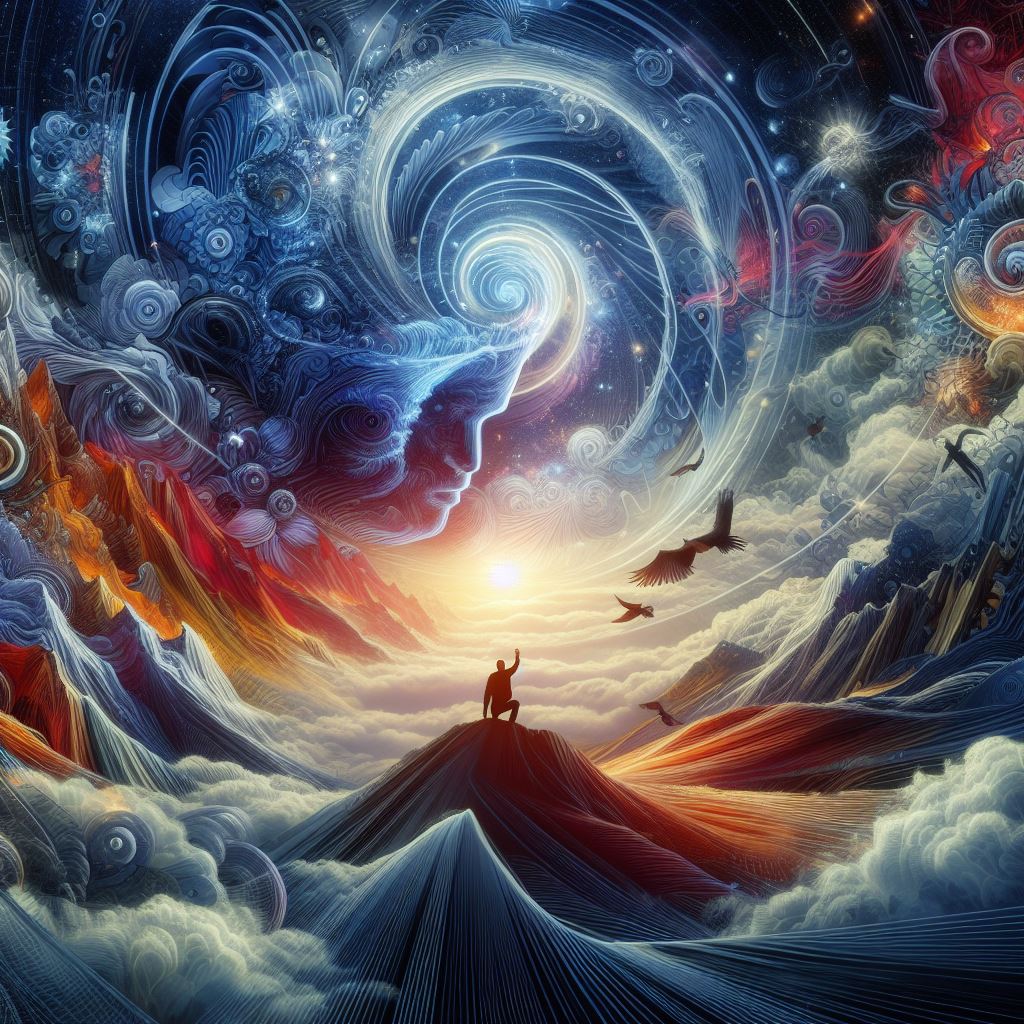Hey there, sweet dreamers! Welcome to this blog. Today we are going very deep into the mystical world of Hinduism and we explore what Hinduism says about lucid dreaming.
So, take a cup of coffee, and let's join this dreamy journey together!
Disclosing The Dreamscape
I hope all of you are familiar with lucid dreaming. If not then let me tell you that in a lucid dream, you become conscious that you are dreaming.
And when you realize this in the dream world, then you can do anything in this type of dream. Anything!
Now, let's crack what Hinduism has to say about this mind-bending experience.
What does Hinduism say about Lucid Dreaming?
The Ancient Scriptures
- Hinduism is a treasure trove of ancient scriptures, and it's quite surprising that it does touch upon the realm of lucid dreams.
- In texts books such as Upanishads and the Vedas, dreams are considered a bridge between the physical and spiritual worlds.
- It is similar to cosmic Netflix where your soul gets a sneak peek into the divine storyline.
The Concept of Maya
In Hinduism, there is a concept of Maya thousands of years ago. Let me clarify for you that Maya is the illusion that veils the true nature of reality.
Both dreams and reality fall under the concept of Maya. The reality that we perceive in the real world may not necessarily be the ultimate truth. It may be the illusion of our mind, just like dreams.
Many Hindu monks say that dreams are very important to understanding the Maya. If one is conscious in his dream world, then soon he realizes that his reality is also an illusion.
They also say that lucid dream awareness is a tool to peek beyond the curtain of illusion.
The Role of Karma
Karma is a fundamental principle in Hindu philosophy. This is all about the law of cause and effect. Now, here is where it gets interesting.
- Some interpretations suggest that lucid dreaming could be a consequence of our past karmic actions.
- If someone has practiced meditation his whole life and gained heightened awareness, the philosophy says that this awareness is carried into his other birth.
- When a yogi(monk) dies then he doesn't lose his siddhi (awareness). This awareness is reflected in his next life.
So, we can say that this type of person naturally tends to have lucid dreams as they have heightened awareness.
This offers a unique playground for the soul to learn and grow even in the realm of dreams.
Yoga and The Path to Lucidity
Now, let's talk about yoga! No, not the downward-dog kind, but the ancient yogic practices that involve meditation and self-awareness.
According to Hinduism, Yogic practices have the power to heighten your consciousness level to a great extent.
Trust me, these practices make your lucid dream not just a random occurrence but a deliberate exploration of your inner realms.
The yogic path says that awareness is key to going to sleep consciously. Mainly hindu philosophy talks about dreamless sleep rather than lucid dreaming.
- If one is interested in lucid dreams then he can enjoy it but the main thing is to experience dreamless sleep consciously.
- Krishna says that in the darkness of night, all people go to sleep but yogi(monk) remain conscious. It doesn't mean that yogis do not sleep at night.
- No, he sleeps but remains aware in his sleep. His body goes to sleep but he, the self, remains awake and alert.
Lucid Dreams As a Spiritual Gateway
Picture this - dreams as a spiritual gateway. Some very old Hindu scriptures like Patanjali Yoga Sutra suggest that dreams, especially lucid ones, can serve as a portal to connect with higher consciousness.
In conscious dreams, you can able to talk with the divine and get spiritual knowledge. Your subconscious mind interacts with you in the form of a guide or divine.
The Lucid Dreamscape As a Training Ground
Now, let's put on our dream explorer hats. Hinduism proposes that lucid dreams can be a training ground for the soul.
It is a personal space where anyone can hone spiritual knowledge, play with their fears, and talk to their unconscious mind.
Do you know, that many Indian and Tibetan monks practice meditation even in lucid dreams? Since childhood, students of the monastery learn to have lucid dreams under born tradition. It's a mind-bending culture.
Navigating The Dream Realm
Dreamrs, ever wondered why some yogis are said to possess extraordinary abilities? Well, Hinduism says that these skills could be honed in the lucid dream realm.
A conscious Dream is a dojo where spiritual warriors practice their mind-bending techniques. They prepare for the ultimate quest - self-realization.
Dream Symbolism in Hinduism
Though many dreams are just dust gathered on the surface of the mind, but not all dreams are just the play of the mind.
- Dreams often speak a symbolic language, and all are familiar that Hinduism is no stranger to deciphering these dreamy hieroglyphics.
- There are various types of dreams and all of them have their different interpretations.
- Clear light dream also exists which is famous by the name of lucid dream.
- Scriptures say that in clear-light dreams, the dreamer is aware and he is free from any kind of bond created by dream.
- This type of dream reflects the dreamer's awareness and their higher consciousness.
My Personal Experience
Before we conclude, let me share a quick personal experience regarding lucid dreaming and Hinduism.
A few years have passed, I was reading a book. The name of that book was Vigyan Bhairav Tantra. The methods written in this book are so deep that can't be explained here.
There are a total of 118 teachings in this book, and all the teachings teach the same thing and that is meditation.
There are mainly two techniques in this book that give a description of waking state and sleep.
The main thing in this book is that if a person imagines that he is a form of light all the time, then the day will not be long when he will start knowing that he is light even in his dreams.
In the dream, the person will realize that he is just a light and he will remember that he is in the dream.
Ever since I learned about this method, I started doing more research to gain more in-depth knowledge. This is how the story of my lucid dream unfolds.
Conclusion
At the end of this blog, I would like to say that there is a lot of clear wisdom in Hindu philosophy. Many yogis and philosophers have expressed their views on this.
A lucid dream can give a lot of knowledge to any person. Patanjali has explored this issue in great depth, and Osho Rajneesh has also preached on this state of dreams.
This description is also found in Srimad Bhagwat Geeta. Lord Krishna says that the yogi remains awake even in the dark and deep night when the person is sleeping in the deep sleep of Maya.
Well, that's all we took today.
Frequently Asked Questions About Lucid Dreaming in Hinduism
Q: Can anyone experience lucid dreaming in Hinduism?
A: Yes, according to Hindu philosophy, anyone can potentially experience lucid dreaming. This state can be achieved through practices like meditation and self-awareness.
Q: Are there specific symbols in Hindu dream analysis?
A: Absolutely. Hindu dream analysis involves decoding symbols like snakes, elephants, and more. All of them carry profound meanings and symbols.
Q: How does karma influence lucid dreaming?
A: According to Hinduism, lucid dreaming might be a result of past karmic deeds. This provides an opportunity for spiritual development and skills improvement.
Q: Can lucid dreaming be a part of yoga practices?
A: Yes, yoga, beyond physical postures, is also considered a path to self-awareness. It can also be a tool that shows the path to lucid dreaming experiences.
Q: Is lucid dreaming seen as a spiritual gift in Hinduism?
A: Absolutely. Hinduism views lucid dreaming as a mystical gift. They considered dreams as the shadow of Maya (illusion). If we can decode dreams with the help of lucid dreams then we also can able to escape from this elusive Maya.

.png)




.png)



